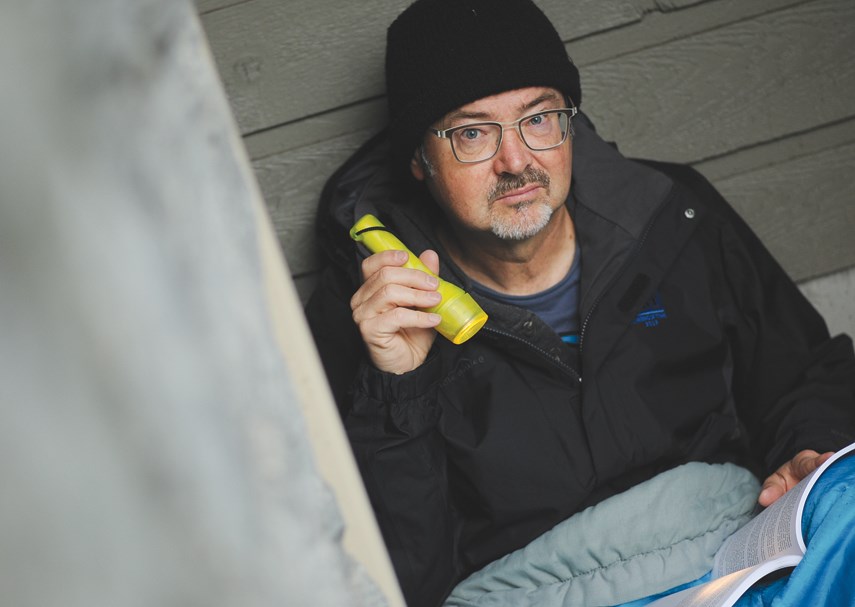You can relate, even if you can’t completely understand.
That’s one of the lessons Lynn Valley entrepreneur and author Nigel Bennett learned five years ago when he first tried to sleep the night away in a Vancouver alley.
Bennett had been challenged to do the Sleep Out to raise money for Covenant House, an organization that helps young people get off the streets.
He agreed but he didn’t know what he was in for.
The founder of Aqua Guard Spill Response spent the night next to a dumpster. Five years later, Bennett can still describe the sound of rats squeaking near his head at 4 a.m.
His recollection of the day after that first Sleep Out is a bit hazy. Much more distinct, he says, is his memory of the evening before.
After taking a tour of Covenant House, Bennett and other business leaders listened to three young people who had been helped by Covenant House.
“To hear what they’ve been through. . . . It just makes you want to cry every time,” he says.
He had a tendency to “look the other way” on homelessness, he recalls. That got harder when he listened to people who had been homeless.
“Everyone’s got a story.”
Many of those stories were harrowing. They were also instructive, Bennett says.
“Anyone of us in that situation would be in the same predicament,” he says.
The more he travels and meets different people, the more Bennett has realized how tenuous life can be.
He recently spent time in High Desert State Prison, a California facility about 140 kilometres north of Reno, Nev. As the founder of a company, Bennett was taking part in Hustle 2.0, a program designed to help incarcerated people learn business skills.
“If they ever do get out they’ll have skills to go and start a tiny little business like a food truck or a mobile mechanic shop,” he says.
But at High Desert, most of the prisoners are there for life.
Over two days he met a lot of prisoners, most of whom were members of gangs in Los Angeles, he says. Some hadn’t had visitors in years. Some had spent years in solitary confinement.
They did one exercise where everyone, entrepreneurs and incarcerated men alike, stepped on a line. Every time someone mentioned something that hadn’t happened to you, you took a step back.
There was a question about hearing gunfire in your childhood neighbourhood.
Bennett stepped back.
Somebody asked about being arrested while still a child.
Bennett stepped back.
By the end, there was a great distance between him and the convicts. But there was also a closer understanding.
Maybe you start out stealing something, Bennett reasons.
“Next thing you know you’re in prison. But when you’re in prison, you’re in a gang. You’ve got to be in a gang.”
And once you get some prison time, more time has a way of piling up.
“It could have been any one of us,” he says.
At the end of the two days, following a Dragons’ Den-style pitch session, there were a lot of hugs and tears, Bennett says.
“They were so appreciative that somebody would come and visit them.”
But looking at their faces, what struck Bennett was how young they looked. Everything we depend on is tied to our youth, Bennett says.
It’s another reason the Covenant Sleep Out is so important, he says.
“I just can’t imagine the kids that are out there,” he says. “Night after night without getting sleep.”
Sleeping in the city can be cold and uncomfortable, but what jarred Bennett most was the noise. Sirens, traffic, yells kept him up through the night.
“Whenever I do this, the next day I can’t function,” he says. “I just can’t imagine trying to live and survive on the street in that daze.”
Besides offering 63 beds for young people in crisis, Covenant House also does outreach for homeless youth.
Some nights, there are as many as 1,000 youth on the streets. Travelling on foot, Covenant House staff check in, often offering food, counselling or minor medical attention, according to a statement from Covenant House.
“We invite them to come to our drop-in program for a hot meal or help to get back on their feet, sometimes connecting them with psychiatrists, social workers, or helping them get medical care,” according to the agency.
Over the longer term, Covenant House also offers the Rights of Passage program, which allows young people who submit to a curfew and take classes to eventually earn their own private apartment.
The Sleep Out event is critical for an organization that gets 94 per cent of its funding from approximately 57,000 individual donors.
“It’s such a really well-run organization,” Bennett says.
Bennett has made a good living making booms and skimmers to treat oil spills. With that success, he explains there comes
an obligation.
“We just have a responsibility to help our communities and give back in whichever way we can as opposed to just trying to make as much money as we can.”
And, he adds, it is only once a year.
“What’s once a year?” he says. “It’s nothing.”
This year’s Sleep Out is set for Nov. 21.
For more information or to donate click here.



